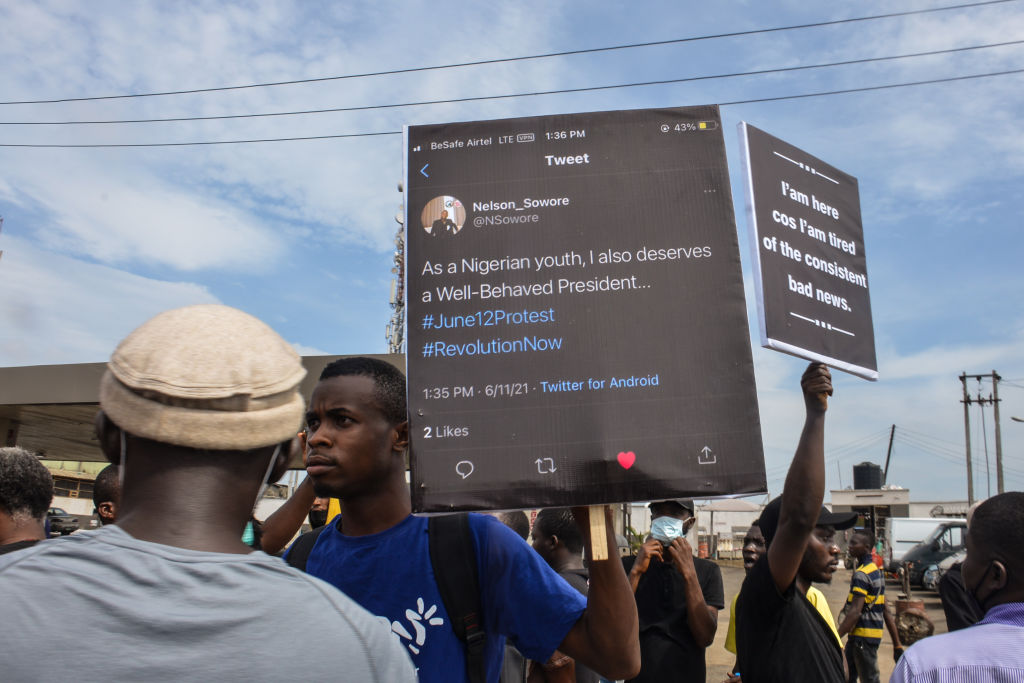
Twitter users in Nigeria were allowed to access the platform for the first time in seven months last week, after the government there reversed its controversial ban on the social media site.
Nigeria’s government ordered telecom companies to block access to the site in June, after Twitter removed a tweet by President Muhammadu Buhari seen to be inciting ethnic violence, for breaching its “abusive behavior” policy. The administration retaliated against the social media platform, which is widely used by journalists and activists in the country, blocking the site from its mobile networks and condemning what it called “activities that are capable of undermining Nigeria’s corporate existence” on the platform.
Nigeria lifted the ban on Jan. 13 after it secured Twitter’s commitment to opening a local office, appointing a head for its business in the country and paying domestic taxes. Months before the ban, Twitter chose Ghana as the location of its first African office, overlooking the continent’s biggest market, Nigeria.
While Nigerians can now access Twitter without using a virtual private network (VPN), a number of other countries continue to block access to mainstream social media sites.
China
Meta-owned Facebook and Twitter have been blocked in China since 2009, as part of a government crackdown against activists following deadly riots in Xinjiang province. China’s restriction of foreign media platforms and censorship of non-governmental material has been dubbed the Great Firewall of China. Meta’s messaging platform Whatsapp and its photo- and video-sharing app Instagram are also blocked.
WeChat, a multi-purpose messaging system developed by Tencent, is the widely used alternative in China. The app has been subsidized by the government since its creation in 2011, and is obliged to share users’ data with the state. WeChat has a monopoly on user data, including mini-apps to pay bills, book doctors appointments and file police reports. In 2017, WeChat unveiled plans for virtual ID cards that would be recognized by the state.
Although video-sharing app TikTok was developed by Chinese company Bytedance, it is not available in China. Instead users can download a twin app, Douyin, which was also developed by Bytedance. Douyin features restrictions such as blocks on international content and limits on children’s usage. The Chinese state owns a stake in the Bytedance subsidiary that controls its domestic Chinese social media and information platforms.
India
When TikTok launched in India in 2016, the country became one of Bytedance’s biggest markets outside of China: Data published in April 2020 showed that 30% of TikTok’s downloads came from India. The app supported multiple regional languages, making it accessible to many people in the country.
However, in June 2020 the Indian government banned TikTok, along with 58 other mobile apps, citing “activities…prejudicial to sovereignty and integrity of India, defence of India, security of state and public order.” The move was seen as retaliation by the Indian government to clashes between Indian and Chinese forces at the Himalayan border. Chinese app WeChat was also blocked. ByteDance has scaled down its Indian operations, essentially withdrawing from the country since the ban.
Iran
Facebook and Twitter have been banned in Iran since 2009 amid disputed elections and mass protests, limiting public government opposition. Some users have learned to bypass the blocks by using a VPN. However, proposed legislation could criminalize VPNs, require IDs to access the internet, and give security agencies control of the web. In 2020, Iran announced it was working with China to create a national Iranian internet, possibly introducing similar controls to the Great Firewall of China.
In January 2021, Twitter blocked an account some believe to be linked to Iran’s Supreme Leader, Ayatollah Ali Khamenei, which made a threat towards Donald Trump. Khamenei himself has an official Twitter page.
North Korea
North Korea officially blocked Facebook and Twitter in 2016, and announced that anyone trying to access them in an “improper” way or distribute “anti-republic data” from them would be punished.
Prior to the ban, few North Koreans had access to the worldwide web, and most were limited to a government-controlled intranet. The official blocking of social media websites mostly affected foreigners from posting information from North Korea to the wider world.
Turkmenistan
The ex-Soviet Central Asian state bans Western social media platforms as well as popular Russian networks. In addition to blocking Facebook and Twitter, Turkmenistan, which is largely Muslim, asks citizens to swear on the Quran when signing up for a home internet connection that they will not access VPNs. Students are asked to sign statements pledging not to use the internet to access banned sites.
More Must-Reads from TIME
- Cybersecurity Experts Are Sounding the Alarm on DOGE
- Meet the 2025 Women of the Year
- The Harsh Truth About Disability Inclusion
- Why Do More Young Adults Have Cancer?
- Colman Domingo Leads With Radical Love
- How to Get Better at Doing Things Alone
- Michelle Zauner Stares Down the Darkness
Contact us at letters@time.com